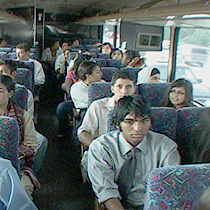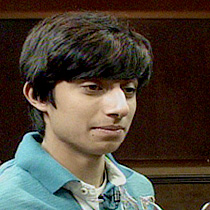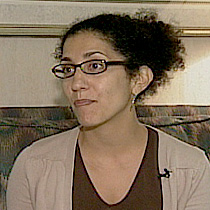2007年VOA标准英语-Youth Exchange Program Aims to Build Bridges of(在线收听)
Washington
26 June 2007
Youth exchange programs provide students with opportunities to learn and better understand different cultures and people outside their countries. Several hundred-exchange students from Middle East, Africa and Asia recently returned home after a year-long stay in the United States. A few of the students shared their experiences with VOA's June Soh before their departure. Carol Pearson narrates the story.
 |
| Student from 30 countries come to the U.S. to study as part of the Youth Exchange Program |
Leila Kabalan, from Lebanon, spoke about what she has learned by participating in the exchange program. "I learned a lot of things. People (Americans), if they want something, they don't consider it impossible. They just go out and try to do it, go to their senators and talk to their senators and to their representatives. So I learned that we as citizens, we shouldn't just sit around and complain. That's one of the most important things that I learned here."
Leila was one of more than 300 students from countries with significant Muslim populations. The students stayed with host families across the U.S., attended high schools and participated in various community activities.
Leila stayed in Greenbelt, Maryland. "In my English class when I asked, 'Does anybody know where Lebanon is?' there was only one person who actually knew where the country is. There were, like, more than a quarter of the class didn't even know there was a country out there called Lebanon. So I felt really such an accomplishment that now because of me some people know about my country."
 |
| Waleed Nasir |
YES is operated by a consortium of private exchange organizations and sponsored by the U.S. Department of State to provide scholarships. Since the program was established in the aftermath of the terrorist’s attacks on the United States in 2001, about 2,000 mostly Muslim students have participated.
 |
| Mary Karam |
Many of the returning students expressed similar views. They say that they now feel it is their responsibility to make the world a better place to live, and they want to help promote understanding and tolerance among different cultures, religions and people.